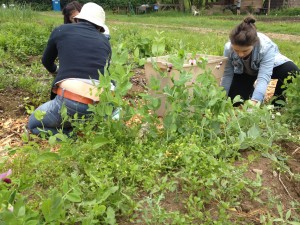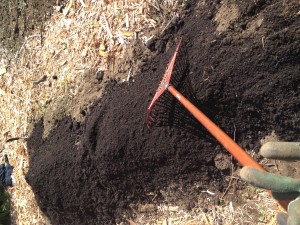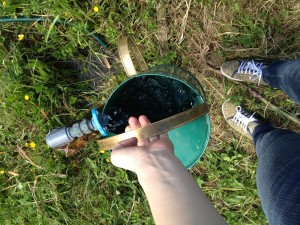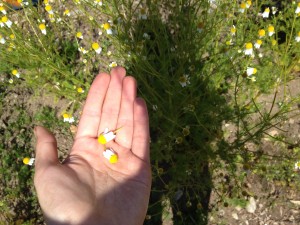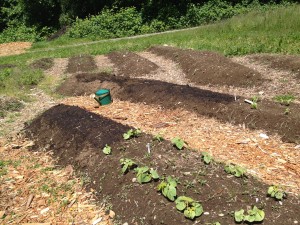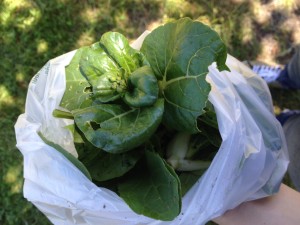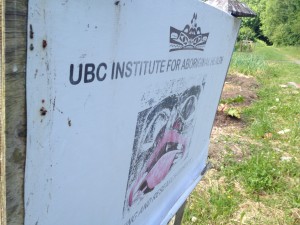 A few days ago on June 3 was my first time volunteering at the UBC farm and it was a blast! I signed up for the volunteer shift a couple weeks ago, knowing that I wanted to volunteer with the Indigenous Health Gardens. I wanted to learn more about traditional and medicinal plants while as taking part in helping maintain the gardens. Nonetheless, I found it to be a very rewarding experience.
A few days ago on June 3 was my first time volunteering at the UBC farm and it was a blast! I signed up for the volunteer shift a couple weeks ago, knowing that I wanted to volunteer with the Indigenous Health Gardens. I wanted to learn more about traditional and medicinal plants while as taking part in helping maintain the gardens. Nonetheless, I found it to be a very rewarding experience.
My first task on the farm after meeting a few of the volunteers and the coordinator, Hannah Lewis, was to weed two garden beds that were full of different plants. They needed to be weeded in order that we could put in place other plants to be harvested later in the summer. I dove into the job, ready to get my hands dirty!
Now as a child, I remember helping my dad around the house with weeding, gardening, cutting the grace, and all the other odd jobs that need to get done outside of the house. However, I never remembered the job to be so tiring! Looking back, I must have been playing outside more than I was working! But on the farm, I was determined to get the job done with the other volunteers, despite the ache in my back that was starting to form after remaining hunched over to weed after a while. To be honest, it really wasn’t that bad. In fact, after finishing all the weeding in that area (and there was a lot of weeds on the beds!), I felt proud.
After the weeding came the composting. Our little group had to grab wheelbarrows of compost and heap them onto the beds we had just weeded. This then required mixing the old soil with the new compost. Once this was finished, we were finally able to move the potted plants into the garden beds. However, this wasn’t as easy as I thought it would be! We first started by watering the potted plants, making sure the soil within the pot was soaked all the way through. This was to make sure that when taken out of the pots, the plants’ roots would not be exposed and all the soil within the pot would remain in one piece. Thus, it make the transplanting less of a shock for the plant. So, I watered the pots and then tried to take them out of their pots by gently flipping the pot upside down, holding the plant stem, while gently shaking the pot in an effort to try to get the plant and soil out. No such luck. I tried for about two minutes but the plant would not budge! Finally Hannah came over to help get them out and out they slipped, easy as pie. We then dug a little hole in the garden beds with our hands and slipped the plants in, making sure to then cover the area around the plant firmly with more soil. We also made a little mote around each plant so that when the plant was watered, the water wouldn’t stream down the sides of the garden bed but instead would stay close to the plant to make it easier for the little seedling to absorb the water. Especially as a seedling, these little tips help them grow better.
Once we transplanted all the pots, it was harvest time! It was prime time to harvest some chamomile. What I learned was that the chamomile that was ready to harvest would have its petals facing down towards the stem rather than straight outwards. This meant that the bulb in the center of the flower (the stamen or pistil) was largest. Because there were so many flowers within that particular garden bed, the picking seemed to go on forever – not that I particularly minded since it was quite a relaxing job. What was interesting to learn was what Hannah said about how they are traditionally picked. Before we started harvesting, she let us know that normally the Aboriginals would offer the plants some tobacco as a form of thankfulness to the plant. As a result, she asked if we could give some sort of thanks, whether verbally or in our heads, to ensure an air of positivity, especially since the chamomile would be used as a form for medicine for some. I also learned that chamomile is good for digestion and relaxation, so I hope to incorporate that into my diet in the future!
The next thing to do after harvesting was planting some bush beans. Again, we were to weed the area first. Luckily, the area was fairly clear already so that didn’t take very long. Afterwards, we got a few buckets of compost to spread and mix with the original garden bed soil. And then it was planting time! To plant, we pushed two fingers into the soil, only up to our knuckles. We then spaced out the pair of holes about a foot apart to ensure each plant had enough space. We put a seed in each hole, covered the hole up, and finished with a good watering over top.
By this time, it was the end of our work shift. We ended off with putting all the tools back into a nearby shed and Hannah showed us some harvest we could take home! I ended taking home some little potatoes, arugula, and bok choy. I was very excited to cook up my veggies after what felt like a very productive (but tiring!) morning. I found it to be a really great experience overall because it reminded how you get your food. Often times, I forget that food doesn’t just come from the grocery store. Food has to be nurtured, cared for and by volunteering at the farm, this was exactly what I got to do. Although I thought it was more laborious than I expected, it was an experience that made me appreciate my food while reminding me the value and work that gets put behind it.
